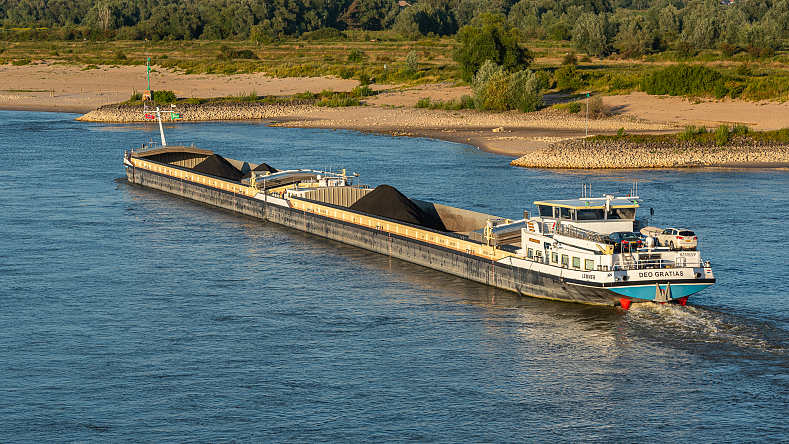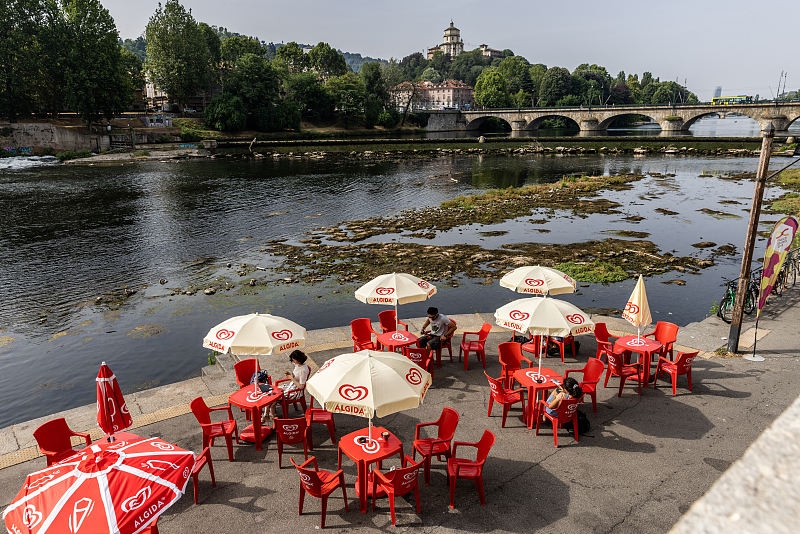
River Waal and from German side - Rhine is seen with a very low water level, cargo ships find it difficult to navigate in Nijmegen - Netherlands on August 7, 2022. /CFP
River Waal and from German side - Rhine is seen with a very low water level, cargo ships find it difficult to navigate in Nijmegen - Netherlands on August 7, 2022. /CFP
Editor's note: Thomas W. Pauken II is the author of "U.S. vs China: From Trade War to Reciprocal Deal," and a consultant on Asia-Pacific affairs and geopolitical commentator. The article reflects the author's opinions and not necessarily the views of CGTN.
Large parts of Europe have gotten scorched by a fierce heat wave and severe dry spell that had started in June and has continued on in August, likely to last for another few weeks. Nonetheless, droughts do happen including in the European countries that normally don't experience prolonged heat and dry weather in the summer-time.
Despite being rare climactic events for much of Europe, Brussels and European Union member states should have upgraded their water pipes and improved water usage plans in prior years. They dropped the ball. Now many Europeans are paying the heavy price over such careless errors by their leadership.
The drought is having a disruptive impact on the daily living patterns of ordinary Europeans, as well as with hindering routine business activities in the western, northern and central regions of the continent. Europe's major rivers – Rhine, Danube and Po – are running dry while transport cargo ships must face severe restrictions when passing through.
The governments of France, Netherlands, Germany, Italy, Hungary, and Romania among many others have imposed water rationing, curbed irrigation on agriculture and restricting water use to cool nuclear reactors in France, located on the Rhone and Garonne rivers. As the drought continues onward, we should anticipate tougher challenges to come.
It's anticipated that the Rhine, a 760-mile long river that flows from the Swiss Alps, runs through France and Germany and emptying out into the North Sea, will shut down for transport ships.
That's a huge hit, since an estimated 80 percent of Europe's inland waterways have freight transport going through the basin's major cities – Cologne, Dusseldorf, Rotterdam and Basel, according to the Website, Maritime Executive.

The water shortage in the river Po in the central area of Turin creates an unreal situation with the river almost completely dry. /CFP
The water shortage in the river Po in the central area of Turin creates an unreal situation with the river almost completely dry. /CFP
Tragedy could have been averted
The overall EU and United Kingdom economic conditions stand on the cusp of catastrophe with looming energy shortages, soaring inflation rates and serious supply chain disruptions. It's been a horrendous year for Europe, while the Russia-Ukraine military conflict has led to economic sanctions imposed on Moscow. The big drought has exacerbated their problems.
The EU Commission issued directives in 2018, calling for its member states to write up official drought response plans and to construct infrastructure that would deepen the rivers and create low-lying barges. Nonetheless, the capital cities failed to follow up.
Ironically, Europe was struck by a severe drought in 2018 and so it seemed logical for EU member states to take the threat seriously and to prepare accordingly. But the Europeans took a lackadaisical approach. Sadly, it's the ordinary Europeans who are feeling the brunt of the pain.
Low freshwater levels make it much harder to keep regional power plants running. Nuclear reactors require abundant water supply to keep them from over-heating. A rising number of EU member states have restarted coal plants, but huge coal supplies need to get transported and river cargo boats do the heavy lifting.
But the Rhine water levels are so low that officials are restricting ships from passing through, unless they are filled only at 25 percent capacity. In ordinary times, cargo ships on the Rhine carry bulk loads of agriculture products, coal, oil and chemicals. The Rhine is expected to implement a total shut down for ships and that will be catastrophic for Germany's manufacturing base.
France and Italy are struggling too
Germany is not the main country enduring devastation from this summer's drought. A number of EU member states have reported their hottest July in recorded history. The French government disclosed that 100 municipalities in the country are tapped out of drinking water.
"Trucks are taking water to those areas, as there is nothing left in the pipes," the French Minister for Ecological Transition Christophe Béchu is quoted in media reports as saying. "This is a situation like nothing we've ever seen ... And the bad news is that, as far as we can see, there's no reason to think that it will stop."
We have a shocking admission here and it's likely many other European cities will confront similar problems. When there are no water in the pipes, local residents can't take showers and must rely on clean water transported by trucks.
Accordingly, families are left to choose: drink water or take a shower? Hence, hygiene and public health problems will rise to alarming levels.
Italy's River Po Valley has also been hard hit, while 16 cities in the region are on 'Red Alert' with high temperatures rising above 40°C. The country's agricultural harvests are expected to drop by one-third, compared to prior year.
Poor preparations lead to greater dangers
The European Union Commission loves to talk about Climate Change, as well as how Brussels and its member starts are highly concerned about it. And if indeed, they are worrying about such environmental issues - you would think the EU would have pushed ahead on more effective drought prevention measures and infrastructure building.
If there's climate change ongoing that would infer that droughts and heat waves in Europe will become more common. The EU should mitigate the impact by upgrading their water pipes, conserving water usage by integrating smart technologies and building more infrastructure projects to recycle water.
Nonetheless, EU member states have not pushed ahead on such common sense solutions. Europe can't avoid the rising threats of droughts. Brussels has to do better than before.
(If you want to contribute and have specific expertise, please contact us at opinions@cgtn.com. Follow @thouse_opinions on Twitter to discover the latest commentaries in the CGTN Opinion Section.)

